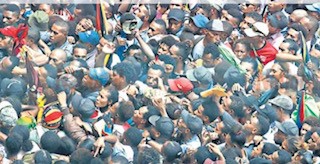This is a
companion piece to the preceding post in which I considered the extent to
which international differences in personal freedom reflect people’s values.
The extent
to which international differences in economic freedom reflect different values
is of interest because it has bearing on the extent of popular support likely
to be given to policy proposals involving expansion or restriction of economic
freedom. If people feel that existing economic policy regimes are aligned with
their personal values, they are less likely to support radical change.
The
accompanying graph suggests the existence of a positive relationship between an
index of facilitating values and economic freedom. As suggested in the label of
the horizontal axis, the index of facilitating values reflects the priority
that people in different countries place on autonomy, and the extent of
interpersonal trust in different countries.
Indexes
I am not
aware of any other index of values facilitating economic freedom similar to the
one I constructed in preparing the graph, even though there has been a
substantial amount of previous research undertaken on cultural values
supporting economic growth and institutional change. (Nicholas Moellman and
Danko Tarabar have referred to some relevant literature in their article,
‘Economic Freedom Reform: does culture matter?’, Journal of Institutional
Economics (2022), 18, 139-157.)
The
priority people place on autonomy seems likely to be important in facilitating
economic freedom because respect for individual autonomy implies respect for
individuals engaged in commerce, particularly innovators. Trust of strangers seems
likely to be important in facilitating economic freedom because it reduces the tribal
instinct to seek to use the powers of the state to advance the interests of
group members at the expense of other groups.
I have used
Christian Welzel’s autonomy index to measure autonomy. This index uses three
items in the World Values Survey (WVS) which ask respondents their views about
desirable child qualities. Autonomy is considered to be valued more highly by
those who independence and imagination as desirable child qualities but do not
consider obedience as such a quality. (See: Christian Welzel, Freedom
Rising, 2013). I used an updated version of the index based on the latest
round of the WVS (2017-2022).
Welzel’s generalized
trust index was used to measure interpersonal trust. This index gives higher
weight to trust of strangers than to trust of family. I reconstructed the index
for the latest round of the WVS by combining items covering close trust (trust
of family, neighbours, and people you know personally), unspecified trust
(whether most people can be trusted) and remote trust (trust of people you meet
for the first time, people of another religion and people of another
nationality). Unspecified trust was given double the weight of close trust, and
remote trust was given three times the weight of close trust.
In
constructing the facilitating values index, autonomy was allocated 75% of the
weight and generalized trust was allocated 25%. Those weights were chosen on the
basis of regression analysis using the autonomy and generalized trust indexes
as explanatory variables to explain economic freedom. (Researchers seeking
further information about the methodology used in constructing this index are
welcome to contact me.)
The Fraser Institute’s economic freedom index incorporates
a large number of indicators relating to size of government, legal systems and
property rights, sound money, freedom of international trade and regulation.
Discussion
My focus is
on the outlier data points in the accompanying graph, and particularly on those
countries which have substantially lower or higher economic freedom than might
be predicted on the basis of values facilitating economic freedom.
One of the
first things readers may notice in the graph is that values facilitating
economic freedom are shown to be higher in China than in the U.S. and
Australia. That may seem surprising if Geert Hofstede’s analysis, or your knowledge of cultural heritage, has
led you to expect Chinese people to be much less individualistic than Westerners.
If you need to be persuaded that many Chinese people have an individualistic
perception of human flourishing, you might like to read an article I wrote on that topic in 2021.
While you
are thinking about China, you might like to compare economic freedom in that
country with that in Singapore, Hong Kong, and Taiwan. The most obvious reason
why the latter jurisdictions have greater economic freedom is because they have
adopted market-friendly ideologies.
Similarly, adoption
of market-friendly ideologies explains why Albania has substantially greater
economic freedom than Iran and Libya, and why Chile has greater economic
freedom than Argentina and Venezuela.
Conclusion
The
existence of values facilitating economic freedom helps to explain why some
countries have higher economic freedom than others. However, it seems that a
substantial part of international differences in economic freedom can be
explained more directly in terms of prevailing government ideologies which
either support or oppose free markets.





